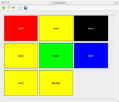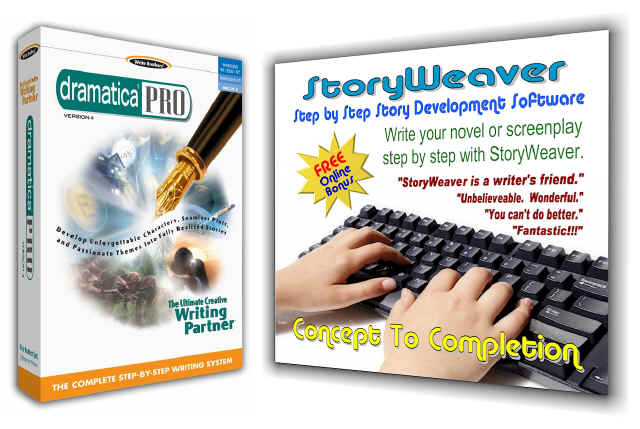|
|
Software |
StoryWeaver
$29.95

A step by
step approach to story development, from concept to completed story for
your novel or screenplay. More than 200 interactive Story Cards guide
you through the entire process.
Details
and Demo
Dramatica
$149.95

The most
powerful story structuring software available, Dramatica is driven by a
patented "Story Engine" that cross-references your dramatic
choices to ensure a perfect structure.
Details
and Demo
Movie
Magic Screenwriter
$149.95

The most
advanced screenwriting software available, Movie Magic is deemed a
"preferred file format" by the Writer's Guild. An industry
standard, MMS is used by professionals and studios around the world.
Details
and Demo
Throughline
Index Cards
$9.95

Interactive
index cards - Name them, add notes, titles, colors, click and drag to
re-arrange, adjust font, save, export and print. An essential tool for
every writer.
Details
Academic
Discounts
on Select Products

Are you a
student, teacher, or academic staffer? Get the very best price on select
products with these manufacturer sponsored academic discounts!
Details

|
| |
Dramatica Writing Tips
How to Tell if your
Story's Structure (Storyform) is Right
A Writer Asks...
My question is: how do you know when you've got your story's structure (storyform)
right?
I Reply...
There is no right or wrong storyform. The Dramatica software makes sure that every
storyform is a dramatically valid one. In fact, you could conceivably calculate out all
the different storyforms that can be created (32,768) and print them out, and just
arbitrarily pick one.
So, why is a storyform "right" for a particular story, but not another? It
has to do with what you, as author, are trying to say to your audience. What is the story
you have in mind? Which storyform accurately reflects that?
A storyform is just the skeleton or framework of a story, so it is often difficult to
determine which one is "proper" for a story you have in mind. What you are
thinking of already has a lot of the story telling done: characters, scenarios, plot
devices. All of these are a combination of the underlying structure and the manner in
which it is expressed by your creative style and inspirations.
So, how can we determine when we have arrived at the best storyform to act as a pattern
for our story? By feel. You need to "feel" that the words that crop up as Story
Goal, or Main Character Domain express what you have in mind, both logistically and
emotionally, for your audience. To do this, you must truly understand what is meant by
Main Character Domain, or any of the other dramatic "appreciations" provided by
the Story Engine. Also, you must develop an empathy with the words that fill those
appreciations, such as Universe, or Psychology.
Getting to know the terminology in Dramatica is the hardest part! The reason it is hard
is that our language tends to create lots of words to deal with common concepts, and
hardly any to deal with less up front notions. For a story to be complete, ALL essential
considerations need to be addressed to prevent holes. So, in the areas in which our
culture does not focus, there are few (and sometimes no existing) words to do the job.
This means that there will be appreciations and the words that fill them that are easily
understood, and a whole range of other terms that are progressively more obscure. But, to
have a feel for which storyform is "right" requires becoming familiar with all
of these terms. The more you are comfortable with, the stronger your sense of which
storyform is best will be. Your choices in creating a storyform will become more precise
and meaningful, and the end product will better reflect what you had in mind.
It seems like even the examples you give in the documentation could go other ways just
by changing the verbs used in describing them. For example, the story I'm working on is a
mystery. The characters are trying to decipher the clues that will help them discover the
identity of the mystery person so they can help her. What I can't decide is: are they
concerned with doing (helping someone), obtaining (the answer to the clues), or learning
(the identity)? And then I wonder if I'm in the wrong domain -- solving a mystery is an
external activity, but maybe the mystery itself is an external situation. Is there a
general blueprint for mystery stories?
The "mystery" is a genre of story. Some genres describe settings, like
"westerns". Others describe character relationships, such as "buddy
pictures", or "love stories". A mystery can either describe characters who
are trying to figure something out, as in the old "Columbo" series, where the
audience knew who the killer was from the very start, or they can be mysteries to the
characters AND the audience, such as most Agatha Christie stories, or the Sherlock Holmes
stories. A few mysteries have the characters knowing the score, but the audience being in
the dark. The one combination that is NOT a mystery is when both characters and audience
know the facts up front.
This difference in focus prevents there from being a single, typical
"mystery" storyform. If the mystery part resides with the audience, then it
comes from the storytelling, not the storyform. If the mystery is at least partly with the
characters, then it becomes part of the storyform as well.
The "Types" you mentioned above, Learning, Understanding, Doing, and
Obtaining, are all from the Physics "class" and describe activities. This does
not make them any more appropriate to a mystery than any of the Types in the other three
"classes". For example, in the Universe Class are the Types, Past, Present,
Progress, and Future. If one were writing a mystery about finding the killer of a school
boy twenty years ago before he can repeat his crime on the twentieth anniversary, these
types might best describe the chase.
In fact, all sixteen Types (four from each class) will show up in EVERY storyform. The
difference is: from what point of view are they explored? The Main Character Domain will
be the Class that contains the Types that best describe what the Main Character is
involved in or concerned with. The Objective Story Domain will be the Class that contains
the Types that best describe what ALL the characters of the story are jointly involved in
or concerned with. So, in creating a storyform that is "right", you will need to
consider which set of Types you want your characters to explore, which are right for your
Main Character, your Obstacle Character, and your Subjective Story.
Think about the kinds of things you want each of these four areas to explore, or
examine. Think about the kinds of scenes that might be created that revolve around these
Types of Concerns. That can go a long way to determining how to make your selections that
will lead to a storyform that fits your desires as an author.
Melanie Anne Phillips
Visit
the Dramatica Theory Home Page
Try Dramatica & StoryWeaver Risk
Free*

$179.95
$29.95
*Try either or both for 90 days. Not working for you?
Return for a full refund of your purchase price!
About Dramatica and
StoryWeaver
Hi, I'm Melanie Anne Phillips,
creator of StoryWeaver,
co-creator of Dramatica
and owner of Storymind.com. If you have a moment, I'd like to tell you
about these two story development tools - what each is designed to do, how
each works alone on a different part of story development and how they can be
used together to cover the entire process from concept to completion of your
novel or screenplay.
What They Do
Dramatica is a tool to help you
build a perfect story structure. StoryWeaver is a tool to help you build
your story's world. Dramatica focuses on the underlying logic of your
story, making sure there are no holes or inconsistencies. StoryWeaver
focuses on the creative process, boosting your inspiration and guiding it to add
depth, detail and passion to your story.
How They Do It
Dramatica has the world's only
patented interactive Story Engine™ which cross-references your answers to
questions about your dramatic intent, then finds any weaknesses in your
structure and even suggests the best ways to strengthen them.
StoryWeaver uses a revolutionary new
creative format as you follow more than 200 Story Cards™ step by step through
the story development process. You'll design the people who'll inhabit
your story's world, what happens to them, and what it all means.
How They Work
Together
By itself Dramatic appeals to
structural writers who like to work out all the details of their stories
logically before they write a word. By itself, StoryWeaver appeals to
intuitive writers who like to follow their Muse and develop their stories as
they go.
But, the finished work of a
structural writer can often lack passion, which is where StoryWeaver can help.
And the finished work of an intuitive writer can often lack direction, which is
where Dramatica can help.
So, while each kind of writer will
find one program or the other the most initially appealing, both kinds of
writers can benefit from both programs.
Try Both Programs
Risk Free!
We have a 90
Day Return Policy here at Storymind. Try either or both of these
products and if you aren't completely satisfied we'll cheerfully refund your
purchase price.
Our
Complete Catalog of Products
|

Get
the Writer's Survival Kit Bonus Package
FREE with ANY purchase!
A $300 Value!
|
 |
StoryWeaver
- $29.95
Our
Bestseller! A
step by step approach to story development, from concept to completed
story for your novel or screenplay. More than 200 interactive
Story Cards guide you through the entire process.
|
 |
Dramatica
Pro - $179.95
Includes
2 Exclusive Bonuses! The
most powerful story structuring software available, Dramatica is driven
by a patented "Story Engine" that cross-references your
dramatic choices to ensure a perfect structure.
|
 |
Dramatica
Writer's DreamKit - $49.95
Little
brother to Dramatica Pro, Writer's DreamKit is built around the same
patented Story Engine - it just tracks fewer story points. So, you
develop the same solid story structure, just with fewer details.
Perfect for beginning writers or those new to Dramatica.
|
 |
Power
Structure - $149.95
An
all-in-one writing environment with built-in word processor that helps
you organize and cross-reference your story development materials.
INCLUDES DVD SET BONUS!
|
|

|
Power
Writer - $99.95
The little
brother of Power Structure includes the essential organization and word
processing tools writers need the most.
|
 |
Throughline
- Index Cards (Mac) - $19.95
Interactive
index cards - add notes, titles, colors, click and drag to re-arrange.
An essential tool for every writer.
|
 |
Movie
Magic Screenwriter - $149.95
The most
advanced screenwriting software available, Movie Magic is deemed a
"preferred file format" by the Writer's Guild. An
industry standard, MMS is used by professionals and studios around the
world.
|
|

|
Final
Draft - $199.95
Like Movie
Magic Screenwriter, Final Draft is an industry standard, used by many
professional screenwriters and studios around the world.
|
 |
Between
The Lines (Macintosh) - $29.95
The lowest
cost automatic screenplay formatter for Macintosh includes high-end
features such as interactive index cards linked to your script.
|
|

|
 |
12
Hour Writing Course - $19.95
Everything
you need to know about story structure - twelve hours of video on a
single DVD - presented by Dramatica Theory co-creator, Melanie Anne
Phillips.
|
 |
Dramatica
Software Companion - $19.95
More than
four hours of video demonstrations of every key feature in Dramatica,
narrated by the co-creator of Dramatica.
|
 |
StoryWeaving
Tips Book - $19.95
170 pages of
eye-opening essays on story structure, storytelling, finding inspiration
and a wide variety of writing techniques.
|
 |
StoryWeaving
Seminar 8 DVD Set - $99.95
14 hours of
video from a live two day course taught by theory co-creator Melanie
Anne Phillips covering Dramatica story structure and StoryWeaver
storytelling.
|
 |
StoryWeaving
Seminar Online - $49.95
The same 14
hour program presented in streaming video that you can view online or
download for a permanent copy.
|
 |
Dramatica
Theory 2 Hour Audio Program - $19.95
Every key
concept in the Dramatica Theory of Story is fully explained in this
double-CD set.
|
|

|
Writing
Characters of the Opposite Sex - $29.95
A three-hour
audio CD set that explains everything you need to know to create
characters of both sexes that ring absolutely true (and maybe even gain
insight into the communication problems in the real world!)
|
 |
Master
Storyteller Improves Your Writing - $29.95
Become a
better writing with this series of interactive exercises.
|
|

|
How
to Create Great Characters DVD - $19.95
A 90 minute
video program recorded during Dramatica co-creator Melanie Anne
Phillips' live in-person seminar on story structure and storytelling.
|
|

|
Structure
vs. Passion - Audio CD $19.95
The Story
Mind approach to writing uses your own passions to create your story's
structure. It focuses your efforts, clarifies the direction of
your story, and triggers your imagination.
|
|

|
Writing
with the Story Mind - Audio CD - $19.95
Learn how to
psychoanalyze your story's "mind" to uncover and treat
problems with characters, plot, theme, and genre.
|
|

|
|

|
Academic
Prices - Discounts on Select Products
Are you a
student, teacher, or academic staffer? Get the very best price on
select products with these manufacturer sponsored academic discounts!
|
|

|
Package
Deals - Starting at $49.95
Get deep
discounts with these bundles of our most popular writing products.
|
|

|
Writer's
Survival Kit Bonus Package - FREE!
Free with
ANY purchase - Writing software, online writing workshops, writing
seminars on video, story theory book, and much, MUCH more!
|
| |
|
